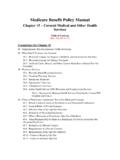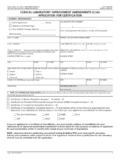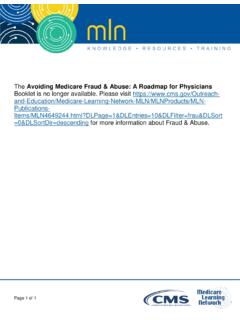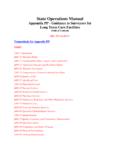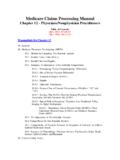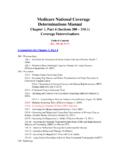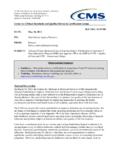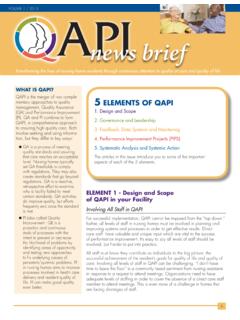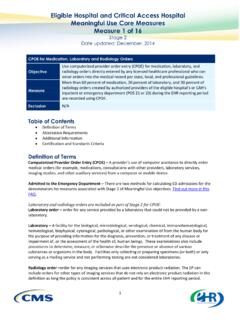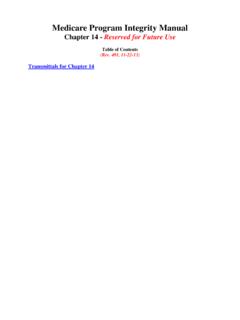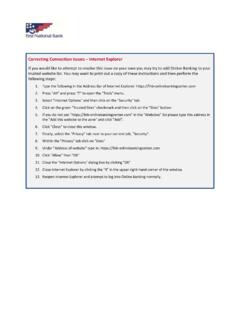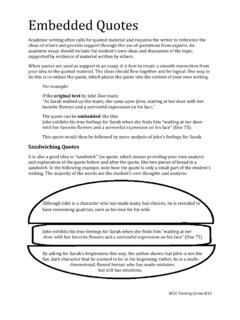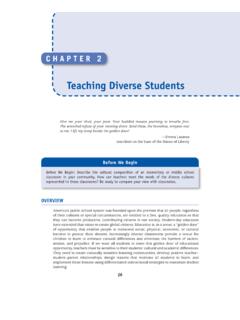Transcription of Prohibition Billing Dually Eligible Individuals Enrolled ...
1 MLN Matters SE1128 Related CR N/A Page 1 of 6 Prohibition Billing Dually Eligible Individuals Enrolled in the qualified medicare beneficiary (QMB) Program MLN Matters Number: SE1128 Revised Article Release Date: June 26, 2018 Related CR Transmittal Number: N/A Related Change Request (CR) Number: N/A Effective Date: N/A Implementation Date: N/A Note: This article was revised on June 26, 2018, to clarify the description of the QMB program. It also adds that starting July 2018 the medicare Summary Notice (MSN) is another way for providers to verify the QMB status of beneficiaries for medicare Fee-For-Service (FFS) claims.
2 All other information remains the same. PROVIDER TYPES AFFECTED This article pertains to all medicare providers and suppliers, including pharmacies that serve beneficiaries Enrolled in Original medicare or a medicare Advantage (MA) plan. PROVIDER ACTION NEEDED This Special Edition MLN Matters Article from the Centers for medicare & Medicaid Services (CMS) reminds all medicare providers and suppliers, including pharmacies, that they may not bill beneficiaries Enrolled in the QMB program for medicare cost-sharing. medicare beneficiaries Enrolled in the QMB program have no legal obligation to pay medicare Part A or Part B deductibles, coinsurance, or copays for any medicare -covered items and services.
3 Implement key measures to ensure compliance with QMB Billing requirements. Use the medicare 270/271 HIPAA Eligibility Transaction System (HETS) (effective November 2017), CMS eligibility-verification system, and the provider Remittance Advice (RA) (July 2018) to identify beneficiaries QMB status and exemption from cost-sharing prior to Billing . Starting July 2018, look for QMB alerts messages in the RA for FFS claims to verify QMB after claims processing. Work with your office staff and vendors to make sure your insurance verification and Billing systems are ready to incorporate these QMB updates.
4 Refer to the Background and Additional Information Sections below for further details and important steps to promote compliance. BACKGROUND All Original medicare and MA providers and suppliers not only those that accept Medicaid must not charge Individuals Enrolled in the QMB program for medicare cost-sharing. Providers who inappropriately bill Individuals Enrolled in QMB are subject to sanctions. Providers and suppliers may bill State Medicaid programs for these costs, but States can limit medicare cost-sharing payments under certain circumstances. MLN Matters SE1128 Related CR N/A Page 2 of 6 Billing of QMBs Is Prohibited by Federal Law Federal law bars medicare providers and suppliers from Billing an individual Enrolled in the QMB program for medicare Part A and Part B cost-sharing under any circumstances (see Sections 1902(n)(3)(B), 1902(n)(3)(C), 1905(p)(3), 1866(a)(1)(A), and 1848(g)(3)(A) of the Social Security Act [the Act]).
5 The QMB program provides Medicaid coverage of medicare Part A and Part B premiums and cost sharing to low income medicare beneficiaries. QMB is an eligibility category under the medicare Savings programs . In 2016, million Individuals (more than one out of eight beneficiaries) were Enrolled in the QMB program. Providers and suppliers may bill State Medicaid agencies for medicare cost-sharing amounts. However, as permitted by Federal law, States can limit medicare cost-sharing payments, under certain circumstances. Regardless, persons Enrolled in the QMB program have no legal liability to pay medicare providers for medicare Part A or Part B cost-sharing.
6 medicare providers who do not follow these Billing prohibitions are violating their medicare Provider Agreement and may be subject to sanctions (see Sections 1902(n)(3)(C), 1905(p)(3), 1866(a)(1)(A), and 1848(g)(3)(A) of the Act). Note that certain types of providers may seek reimbursement for unpaid medicare deductible and coinsurance amounts as a medicare bad debt. For more information about bad debt, refer to Chapter 3 of the Provider Reimbursement Manual ( ). Refer to the Important Reminders Concerning QMB Billing Requirements Section below for key policy clarifications.
7 Inappropriate Billing of QMB Individuals Persists Despite Federal law, providers and suppliers continue to improperly bill Individuals Enrolled in the QMB program. Many beneficiaries are unaware of the Billing restrictions (or concerned about undermining provider relationships) and simply pay the cost-sharing amounts. Others may experience undue distress when unpaid bills are referred to collection agencies. For more information, refer to Access to Care Issues Among qualified medicare Beneficiaries (QMB), Centers for medicare & Medicaid Services July 2015.
8 Ways to Promote Compliance with QMB Billing Rules Take the following steps to ensure compliance with QMB Billing prohibitions: Establish processes to routinely identify the QMB status of medicare beneficiaries prior to Billing for items and services. Use the medicare 270/271 HETS data provided to medicare providers, suppliers, and their authorized Billing agents (including clearinghouses and third party vendors) (effective November 2017) to verify a beneficiary s QMB status and exemption from cost-sharing charges. Ask your third party eligibility-verification vendors how their products reflect the new QMB information from HETS.
9 For more information, visit the HETS website.. MLN Matters SE1128 Related CR N/A Page 3 of 6 In July 2018, CMS will reintroduce QMB information in the medicare RA that Original medicare providers and suppliers can use to identify the QMB status of beneficiaries. Refer to the Additional Information section below for educational materials on recent changes that impact RAs for medicare FFS QMB claims. MA providers and suppliers should also contact the MA plan to learn the best way to identify the QMB status of plan members both before and after claims submission.
10 Providers and suppliers may also verify beneficiaries QMB status through automated Medicaid eligibility-verification systems in the State in which the person is a resident or by asking beneficiaries for other proof, such as their Medicaid identification card, MSN (starting July 2018) or other documentation of their QMB status. Ensure that Billing procedures and third-party vendors exempt Individuals Enrolled in the QMB program from medicare charges and that you remedy Billing problems should they occur. If you have erroneously billed Individuals Enrolled in the QMB program, recall the charges (including referrals to collection agencies) and refund the invalid charges they paid.
